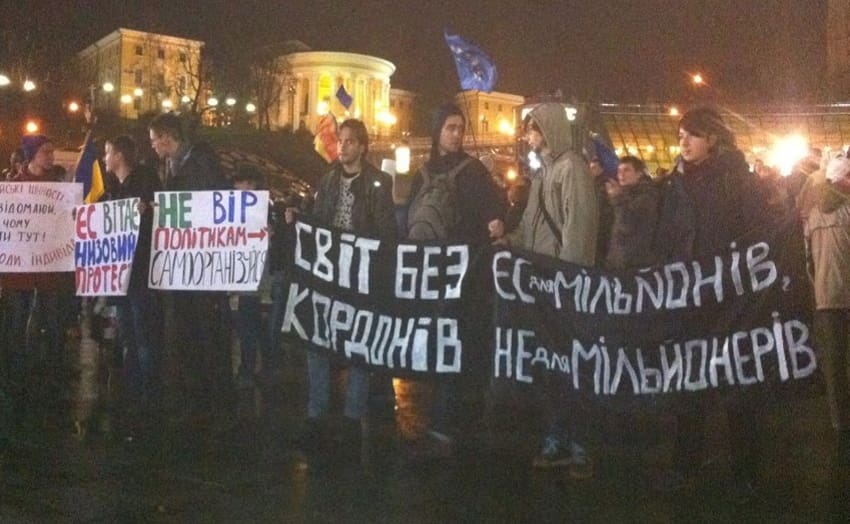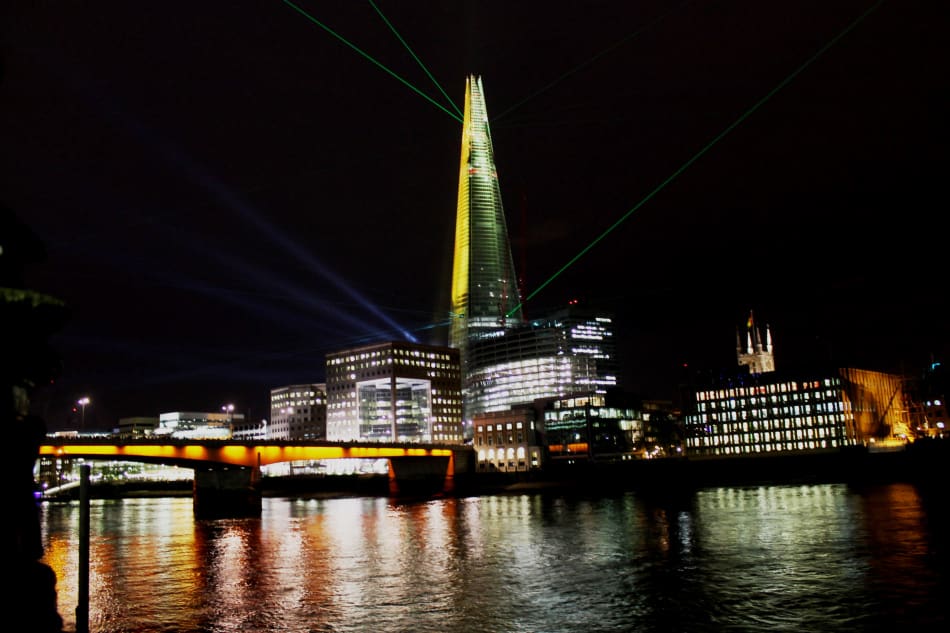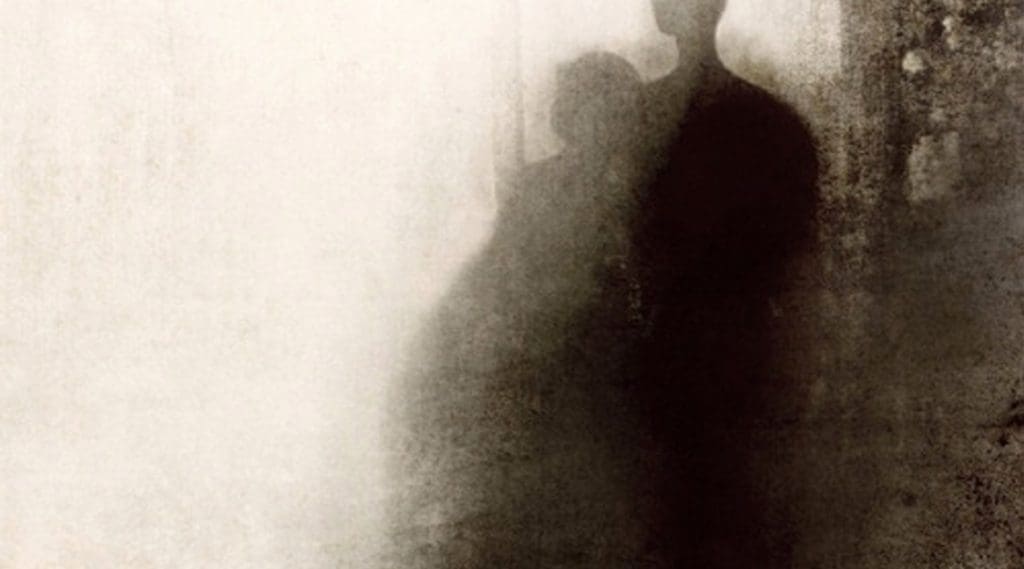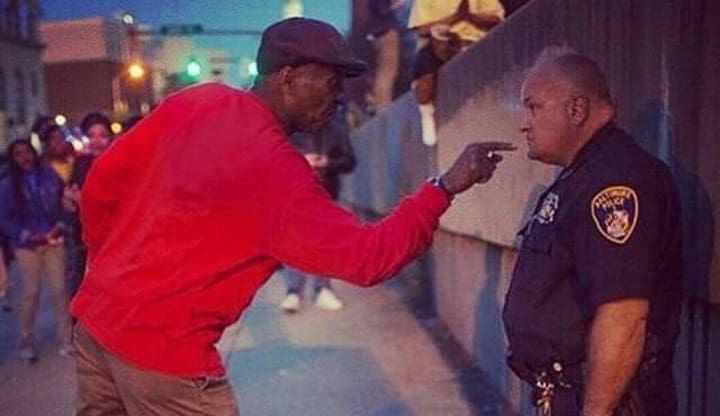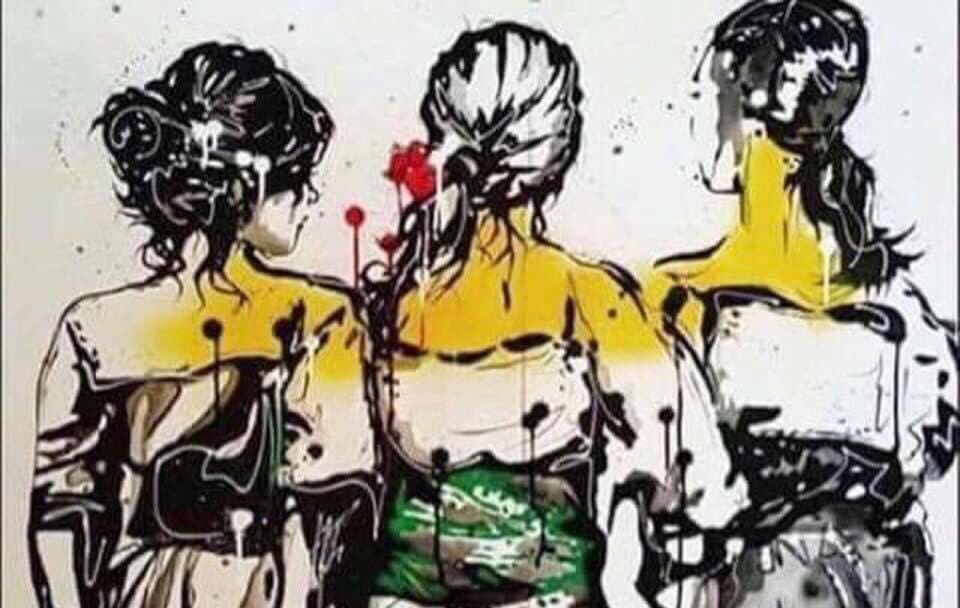AntiNote: As news breaks today of military incidents between Ukrainian government forces and separatist militants in the East, we are once again reeling from the quickly-shifting circumstances in that country. This interview with Volodymyr Ishchenko is less than a week old, and may already be nearing its expiration date…
But: Ishchenko’s statements (as well as his writing; links below) contain a certain wisdom and thoughtful consideration that make them less perishable. As today’s violence sends the international commentariat into fits of hyperbole, lambasting one side or the other (as if there are even just “two sides!”), we find that Ishchenko’s reasoned call for more nuance is as relevant—even urgent—as ever.
Finally, we would like to shout out our friends at LeftEast, a webportal that fosters communication among activists and scholars in Post-socialist regions of Europe—first of all for providing a platform for voices like Ishchenko’s, and secondly for helping us arrange this conversation between him and our other friends and co-conspirators at This is Hell!. We hope this collaboration across continents among AWC’s comrades will not be the last.
“For Ukrainians, as for any other people in the world, the main threat is capitalism.”
Chuck Mertz: On the line with us right now is Volodymyr Ishchenko. He is a sociologist studying social protests in Ukraine. Good evening, Volodymyr.
Volodymyr Ishchenko: Good evening.
CM: Volodymyr’s most recent writing includes Tuesday’s Guardian post Maidan or Anti-Maidan: the Ukraine situation requires more nuance.
This week, Volodymyr, here’s the story from the BBC: Russia and Ukraine agree on steps to end crisis. “Russia and Ukraine struck a deal on Thursday to end unrest in Eastern Ukraine stoked by pro-Russian militants.” Has that agreement solved all of Ukraine’s problems? Do you think that this will provide safety and security for Ukrainian citizens?
One of the stories that’s been going around in the U.S. media is the idea in Crimea, and also in the East of Ukraine, that Kiev has become lawless, it has become run by gangs, that there has been criminal activity, that it is not safe, and they fear that the same kind of chaos is coming to Crimea or Eastern Ukraine.
VI: That’s a very exaggerated picture. Life in Kiev is totally safe. It’s definitely much safer now than in Eastern Ukraine; in Donbas there are armed gangs which have attacked state buildings. Some of them seem to be local protesters, but some of them seem to be too well-equipped and too well-trained to be just some militia. If they aren’t Russians or Russianists, they could also be former riot police officers who left Kiev to escape punishment by the new government.
Kiev is definitely much safer than in February, when there really was chaos and street clashes in the center; the major problem is in Eastern Ukraine.
CM: Let me ask you a couple of really general questions about this protest. Whenever there is any coverage of any protest—it could be Ukraine, it could be Egypt, it could be Venezuela, it doesn’t matter where it is—the media often points out that this is about the economy, and if it weren’t for a downturn in the economy, these protests would never happen. It’s almost as if the media is saying, protests do not happen when people are upset about an infringement on their rights or freedoms; the only thing that drives people out into the streets is the economy.
To what degree did the economy play a role in this Ukrainian uprising? Is this at all about freedoms and rights, or is this just about the bottom line and Ukrainians’ wallets?
VI: There were actually two uprisings. You have the Maidan uprising—that started in December and became more violent in January—and now you have the Eastern Ukrainian uprising. They have many similar traits, but the socio-economic component is somewhat deeper in Eastern Ukraine now, where the economic situation is really deteriorating.
The national currency lost something like 40% of its value during the last two or three months, prices are rising, and people in Eastern Ukraine are mainly workers, pensioners. They are speaking about wages, they are speaking about prices, about the collapse of industry. Some of them demand nationalization, some of them demand decent pay for their work. That protest has more to do with the economy; it’s not just about their identity.
But they also speak, of course, about their dignity, about their language, about their history, about their heroes, and about this federalization question—which also animates the question of recognition of their self-determination, the question of concrete freedoms and rights.
The Maidan protest started more as an ideological protest that was, to some extent, an attempt to break through to the European Dream, seeing it as a kind of utopia which would solve many Ukrainian problems. And for other people, it was a protest against Russia. It was generally believed that if Yanukovych would not sign the European Association Agreement, he will join the Customs Union with Russia, Belarus, and Kazakhstan. These countries were described in quite negative tones as authoritarian, poor countries that Ukraine doesn’t need to orient itself to.
But later during the Maidan uprising, there came the questions of police repression and violence, of the authoritarian laws which were passed in January—they were pulled to the forefront. They became more important than the European Association.
CM: This is the other general question I wanted to ask you: how much are these protests caused by outside forces? Since the Wikileaks revelation from last week—about USAID and the work that they have done in trying to destabilize or help overthrow governments that are not friendly to the United States—there has been some talk in critical sectors of the media, here in the States, about the role that USAID and NED play.
And then if you take the Russian factor—according to the U.S. media, the protesters in Eastern Ukraine are being manipulated by Russia.
So is this really a Ukrainian uprising? Or are these just superpowers playing with a pawn?
VI: Yeah, that’s a big problem now in the discourse. Those who don’t like the Anti-Maidan uprising in Eastern Ukraine see it mainly as Russian manipulation: just irrational, stupid people who want a more authoritarian regime, who want a Russian dictatorship, who do not understand their real interests.
And the symmetrical picture—by the Russian media or by those who didn’t like Maidan protesters—is of manipulation by Western governments or by Ukrainian oligarchs; the claim, again, is that the people do not understand what they are fighting for.
Obviously you cannot deny that both the U.S. and Russia—and the EU—try to influence Ukrainian politics. They would be stupid if they didn’t. They are great powers, they have their imperialist interests, and that’s what we can expect from them.
But then you deny the grassroots nature of this protest. People are talking about real problems. People are self-organizing; both in Maidan in Western Ukraine and in Eastern Ukraine now. And you cannot just reduce it to this great power play.
It also matters when it comes to actual outcomes. What will be the outcome of these protests? In the case of Maidan: we see IMF-required austerity, increasing prices, a new neoliberal government, an increase in the strength of the far Right. And in the case of the Eastern Ukrainian protests—if they do not stop, it will become a real danger to Ukrainian political stability…which in turn would be used by Russia to promote their own interests.
But we need to see this complex combination of various factors. The Ukrainian people hope to solve their problems; they hope to fight for a more just and free society. But they also are influenced by actors from abroad, and unfortunately Ukraine is now seen as the playground of the great powers.
CM: One of the stupid things that the U.S. media is reporting right now is that the entire reason that Vladimir Putin sent the Russian military forces into Crimea—the entire reason that he’s able to flex his muscles on Ukraine—is because he believes that Barack Obama is weak. Do you think that has any basis in reality?
VI: No! That sounds really funny, if it’s true that this is a major narrative. I think the main factor behind the Crimea annexation was internal politics. Putin needed to show the Russian people that any attempt to repeat Ukraine in Russia would not work. Crimea was necessary to increase patriotism among the Russian population, and to decrease any chance that the Russian opposition—which was very much inspired by Maidan—might attempt anything like that in Russia.
A short and victorious operation was very much necessary, and now you see from the polls: something like over 80% of Russians support the Crimea annexation; over 80% support Putin’s policies, and there’s a great extent of national unity around the president.
CM: Here’s what we hear: the West isn’t doing enough to stop Russia, but if the United States and Russia don’t do anything, it’s very possible that Ukraine is going to fall into civil war. Is there a military solution—either intervention by the West, or a civil war—that could solve this problem?
VI: No. A civil war is definitely not a solution. That’s a problem, and a very real one. People are already dying in clashes in Eastern Ukraine—and according to recent polls, over 40% of the Eastern Ukrainian region’s population believes that civil war is very probable in the near future. That shows that it is getting quite dangerous.
And if NATO forces would be involved into pacifying Eastern Ukraine, they would be seen as foreign occupiers. And a military solution is not possible for the Kiev government either. There’s a question as to whether Ukraine has an army right now—an army which can actually fight, not just the people and equipment on paper. There have been cases of soldiers sent to Eastern Ukraine just leaving their military machines to the local protesters and going back. They were not ready to fight them. They were not ready to shoot at them. So it’s not only a question of whether a military solution is desirable, but if it’s even feasible.
“A popular uprising doesn’t mean that revolutionary changes—structural and fundamental changes in social or political institutions—will follow.”
CM: Who is the greatest threat to the Ukrainian people? Is it the West? Is it Russia? Is it the crime bosses within Ukraine? Or is it the Right Sector, the neo-fascist right wing that you’re concerned about?
VI: I would say that for Ukrainians, as for any other people in the world, the main threat is capitalism, and all the problems and wars it leads to. The political crisis in Ukraine started much earlier than 2013— Ukraine suffered a lot already in the economic crisis of 2008. The main enemies of Ukrainians are both Russian and Western imperialism as well as Ukrainian oligarchs and the ruling class.
The best solution—though the most difficult and not the most probable solution—would be for Western Ukrainians and Eastern Ukrainians to unite on some common ground, some common platform of shared demands for social justice, and to fight against the ruling class, against Russian intervention, against possible Western intervention, and against both pro-Ukrainian and pro-Russian far-Right nationalists.
CM: You write a great deal about the Right Sector, about the neo-fascists. Back in early February, a couple weeks before the Yanukovych government fell, you had a piece in The Guardian headlined the Ukrainian protesters must make a decisive break with the far Right, with the sub-headline Neo-fascists have become involved in the Euromaidan protest movement and we can’t turn a blind eye to the danger that presents.
Is it the neo-fascist ideology of the Right Sector that’s popular, or is their popularity more driven by their violent tactics at the Euromaidan, by being the people who confronted the police?
VI: More the latter than the former. They were seen as people’s heroes and the vanguard of the uprising. They got a lot of respect and symbolic capital for that.
But you have to understand that the political mainstream in Ukraine is much further to the right than, for example, in Western Europe. Things which would receive very strong criticism in the West are more or less tolerable in Ukraine. It’s more or less okay to talk about things like “the defense of white European people;” this kind of thing can even be said by mainstream politicians. It’s okay to be homophobic, not to recognize any need to defend LGBT people. In this more right-dominant ideology, the far Right from the Right Sector or from the Svoboda party are not actually seen as something extreme.
Right now, the Right Sector and Svoboda are being criticized because their violent and provocative actions are seen as something that can be used by Russia—the Russian media can capitalize on them and use them to show that there is a very serious fascist threat in Ukraine. So people, even when they criticize the Right Sector, they do not criticize them for their antidemocratic ideology. They don’t criticize them for being extreme Right. They criticize them because they are not “consistent nationalists;” because they appear not to be thinking about the national interests of Ukraine.
The biggest problem in Ukraine is probably this rightwing consensus, and there’s not any serious Left force which could be a challenge to this.
CM: So there is no real alternative, then? Are you saying it’s inevitable that whoever is running the next Ukrainian government will definitely be farther to the right?
VI: No—if you’re speaking about this government, this is a neoliberal government. You cannot say that it’s any kind of fascist junta, which is a popular term used by the Russian media. It’s a neoliberal government; it includes some nationalists from Svoboda, but they are not dominant. And they would not be able to promote any far Right policies before the situation in Eastern Ukraine stabilizes. That would just be extremely stupid.
And we know that the winner of the next election will probably be Petro Poroshenko, who is an oligarch. He is one of the hundred richest men in Ukraine, and he would continue the same neoliberal policy.
CM: To what degree are Ukrainians even going to have a choice, though?
VI: That’s another question, because as far as I can see from the polls, many people from Eastern Ukraine are actually not going to vote in the coming presidential elections. Or if they turn out at all, they are going to vote against all candidates. So whoever wins the coming presidential elections will have serious problems with legitimacy, at least in Eastern Ukraine.
CM: You know our media really likes to try to find a celebrity within any story. And the celebrity that they have found here is Yulia Tymoshenko. Some people have referred to Yulia Tymoshenko as Ukraine’s Sarah Palin. How would you describe the potential for Yulia Tymoshenko to be the next leader of Ukraine, and does it even matter if all she really represents is another neoliberal government running Ukraine?
VI: I would compare her not as much with Sarah Palin, probably, as with Eva Perón, the wife of the 20th century Argentinian leader. She is actually a dangerous person. I am quite sure, if she were faced with something like the Maidan uprising against her, she would be much more ready to suppress it—even more than Yanukovych, for example, or any other major politician in Ukraine.
And at this moment she doesn’t have good chances to win the elections. She is far behind Petro Poroshenko. One of the reasons why all these protests in Eastern Ukraine started now, and why they are so violent, is actually to halt the national elections in May—to postpone them and give Tymoshenko some time to gain more popularity among Ukrainians.
CM: You write that “two popular labels are being ascribed to events in Ukraine: it was either a democratic or even social revolution, or it was a rightwing or even a neo-Nazi coup. In fact, both characterizations are wrong.” So if it’s not a rightwing coup or a democratic revolution, how would you describe it?
VI: I describe it as a popular uprising which led to a change of elites. A popular uprising doesn’t mean that revolutionary changes—structural and fundamental changes in social or political institutions—will follow.
At this moment I do not see anything really changing the fundamentals of Ukrainian oligarchic capitalism. The oligarchs actually have even more power now; many were appointed as governors in some regions, and the likeliest next president is again another oligarch.
It’s not in their interests to fight corruption or to construct transparent institutions in Ukraine. Because their corruption, their close connection to the state, was one of the competitive advantages that allowed them to build their wealth in the first place.
So I do not see the potential for revolutionary change now. At this point it was a popular uprising leading to a change of elites, but not to revolutionary change.
Transcribed from This is Hell! Radio’s 19 April 2014 episode and printed with permission. Listen to the full interview here:
Ishchenko responded to additional questions from Mertz via email in the days following the live interview; this exchange is included in LeftEast’s sister post: http://www.criticatac.ro/lefteast/ukraine-the-main-threat-is-capitalism/
Featured image: Maidan, 25 November 2013. The posters say “A world without borders” and “An EU for millions, not for millionaires.” Source: Zakhar Popovych, Left Opposition, via
People and Nature

